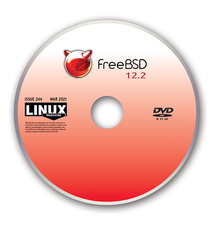On the DVD
On the DVD

FreeBSD 12.2 and GhostBSD
So you think you know open source? Just the fact that you are reading this page means that what you probably know is Linux. This month, the DVD provides a glimpse into another corner of open source – the world of BSD. Like Linux, BSD varieties are free operating systems that are Unix descendants. However, they are released under the permissive BSD licenses rather than the copyleft licenses that dominate Linux. You will also find many other differences, despite the similar underlying structures.
FreeBSD 12.2 (64-bit)
First released in 1992, FreeBSD is the most popular version of BSD, especially for servers. Those coming from Linux will find many details different, such as the device naming system, as well as many commands and applications. More importantly, FreeBSD has never passed through a popularity phase like the one that drove Linux to develop mature desktop environments – although some mature BSD environments are available today. Instead, FreeBSD more resembles Linux in its hobbyist days. For instance, FreeBSD's install is a text-based series of questions with no hardware auto-detection. Furthermore, no desktop environment is installed, although users can add one later.
FreeBSD's assumption is that users have the knowledge or interest to work with FreeBSD until their systems are configured to their liking. Installation is unlikely to produce a working desktop system in 15 minutes. Instead, users should be ready to refer repeatedly to the FreeBSD documentation (https://www.freebsd.org/docs.html) and to fetch desired applications from websites. The reward for this effort will be greater knowledge of Unix-like systems – as well as the satisfaction that comes with doing it yourself.
[...]
Buy this article as PDF
(incl. VAT)
Buy Linux Magazine
Subscribe to our Linux Newsletters
Find Linux and Open Source Jobs
Subscribe to our ADMIN Newsletters
Support Our Work
Linux Magazine content is made possible with support from readers like you. Please consider contributing when you’ve found an article to be beneficial.

News
-
Parrot OS Switches to KDE Plasma Desktop
Yet another distro is making the move to the KDE Plasma desktop.
-
TUXEDO Announces Gemini 17
TUXEDO Computers has released the fourth generation of its Gemini laptop with plenty of updates.
-
Two New Distros Adopt Enlightenment
MX Moksha and AV Linux 25 join ranks with Bodhi Linux and embrace the Enlightenment desktop.
-
Solus Linux 4.8 Removes Python 2
Solus Linux 4.8 has been released with the latest Linux kernel, updated desktops, and a key removal.
-
Zorin OS 18 Hits over a Million Downloads
If you doubt Linux isn't gaining popularity, you only have to look at Zorin OS's download numbers.
-
TUXEDO Computers Scraps Snapdragon X1E-Based Laptop
Due to issues with a Snapdragon CPU, TUXEDO Computers has cancelled its plans to release a laptop based on this elite hardware.
-
Debian Unleashes Debian Libre Live
Debian Libre Live keeps your machine free of proprietary software.
-
Valve Announces Pending Release of Steam Machine
Shout it to the heavens: Steam Machine, powered by Linux, is set to arrive in 2026.
-
Happy Birthday, ADMIN Magazine!
ADMIN is celebrating its 15th anniversary with issue #90.
-
Another Linux Malware Discovered
Russian hackers use Hyper-V to hide malware within Linux virtual machines.

